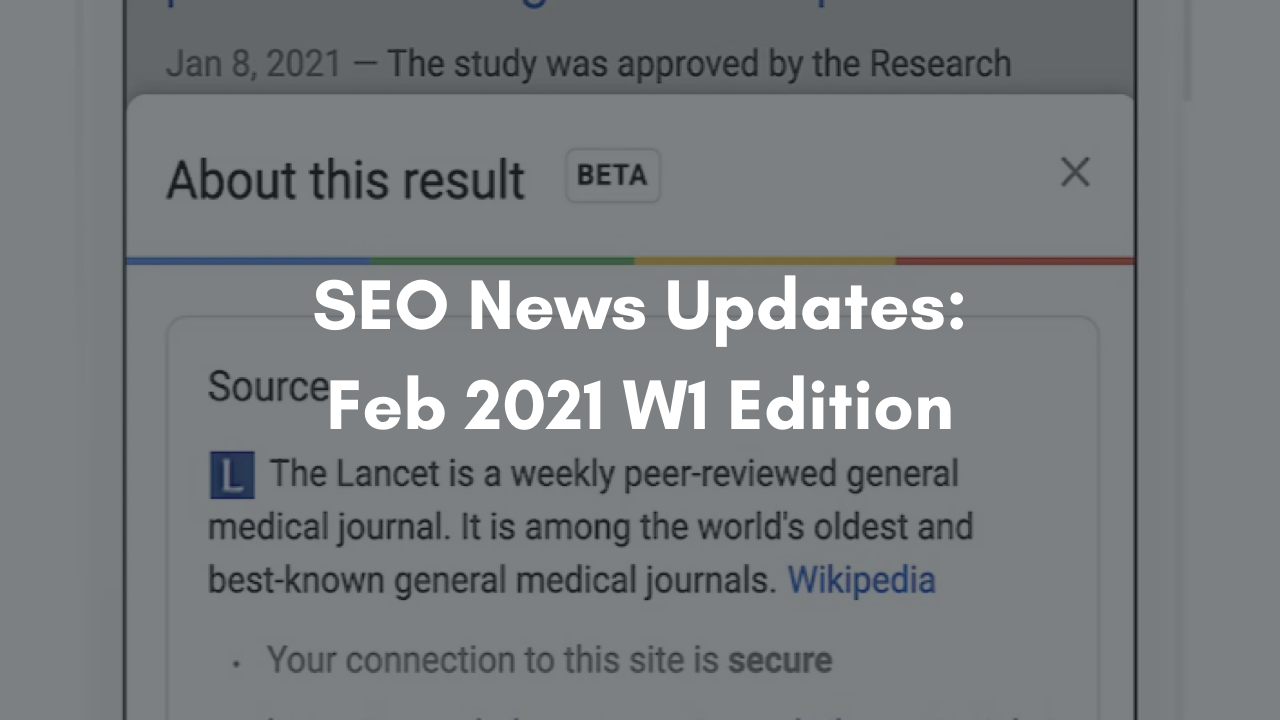Steph W. from SEOPressor


...help you check your website and tell you exactly how to rank higher?


87
score %
SEO Score

Found us from search engine?
We rank high, you can too.
SEOPressor helps you to optimize your on-page SEO for higher & improved search ranking.
By vivian on February 5, 2021

Hi there, SEO Peeps! It’s time for another weekly dose of SEO News. As usual, here’s a quick roundup of what’s important:
Read on to get the juicy details
Google is spotted testing another feature in “people also search for”.
This one overlays entity information in a popup menu when you hover your mouse over the term.
Valentin Pletzer spotted this change and calls it “refinement bubbles within entity popover.”
Someone spotted Microsoft Bing testing the display of estimated reading time for some of the search results.
Within some search result snippets, Bing is adding “estimated reading time” under the snippet.
The article itself does not directly display this information, so Bing could be pulling this from some structured data or perhaps other methods for this.
But personally, I like this clarity and it gives you some idea of what you are getting yourself into. What about you?
Google has launched a feature for its search results snippets that show more information about a search result.
Google was first seen testing this back in 2019 and in 2020, and it looks that the search engine has decided to launch it in BETA mode for now.
This is a feature where you click on the three dots in the search result snippet and Google shows you more information “about this result.”
It can show you information about the site from Wikipedia if it is available.
Google said that with Wikipedia’s open editing model, which relies on thousands of global volunteers to add content, these descriptions will provide the most up-to-date verified and sourced information available on Wikipedia about the site.
If it’s a site you haven’t heard of before, that additional information can give you context or peace of mind, especially if you’re looking for something important, like health or financial information.
However, if a specific website does not have a Wikipedia description, Google will show the searcher additional context that may be available, such as when Google first indexed the site.
Google’s John Mueller was recently asked a question if the value of CLS would be considered differently for different types of sites or pages.
To that, which he answers: Google won’t be giving different levels or metrics of the Core Web Vitals scores based on the type of website or page you have.
So looks like no matter if you are running a news site or e-commerce site, it won’t make a difference when it comes to the Core Web Vitals score Google gives the site.
Here’s the exact reply from Mueller.
Google announced it added Chrome data to the Google Search Console Discover performance report. This means it will include data Chrome users see when they open a new tab on Chrome mobile.
Previously, the report only included data from the Google homepage and Google Search app. Those impressions and clicks from the stories in the Chrome tab were not counted.
Google said this is a gradual rollout, Google wrote “over the course of the next few months, this data will gradually appear in your site’s Search Console Discover performance report. This means your site’s reported traffic levels may rise from where they were.”
Also, Google is adding new referrer data for this.
Discover traffic from Chrome will be using a new origin referrer: https://www.google.com/ so it is consistent with what’s used for Discover on the Google app.
That’s it for this week’s SEO news update, check out our past posts by clicking the SEO News tab on top, or get more in-depth guides on SEO and content marketing by checking out our blog.
Stay safe and leave us a comment below if you have any suggestions on how we can make our weekly SEO news roundups more useful for you.
Updated: 24 February 2026


Save thousands of dollars (it’s 100x cheaper)

Zero risk of Google penalty (it’s Google-approved)

Boost your rankings (proven by case studies)
Rank High With This Link Strategy
Precise, Simplified, Fast Internal Linking.
